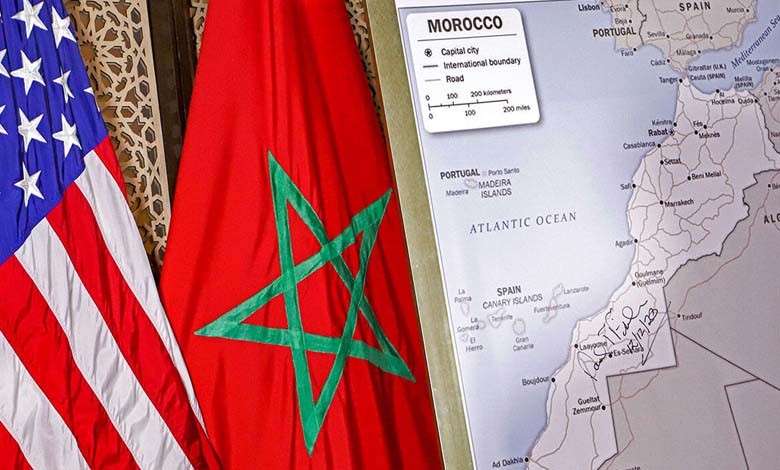Washington urges U.S. companies to invest in Morocco’s Sahara

During his meeting with the Moroccan Foreign Minister, the U.S. Deputy Secretary of State reaffirmed the strength of relations with Rabat and the need to translate them into concrete economic opportunities.
-
Morocco’s Strong Position Pushes Algeria to Avoid Raising the Sahara Issue at the UN Security Council
-
Bourita praised Muscat’s support for Morocco’s sovereignty about Moroccan Sahara
Christopher Landau, U.S. Deputy Secretary of State, stated on Thursday that the United States supports investments in Morocco’s Sahara, where Rabat continues to expand its infrastructure to attract foreign capital. This effort is part of a broader strategy to transform the region into an economic and development hub, underpinned by a series of international agreements.
While the conflict remains frozen, Morocco — which considers the territory an integral part of its sovereignty — continues to face the Polisario Front, backed by Algeria. Yet in recent years, Rabat has secured unprecedented diplomatic achievements, most notably the recognition by several countries, including the United States under former President Donald Trump, of its autonomy initiative and sovereignty over the Sahara.
-
Visit of the U.S. Congress to the Moroccan Sahara: A Strategic Reading of Regional and International Dimensions
-
Morocco Affirms Its Role as a Neutral Mediator in Sub-Saharan African Crises
Following talks with Moroccan Foreign Minister Nasser Bourita, Landau wrote on X: “We will support U.S. companies seeking to invest and do business across Morocco, including in the Moroccan Sahara.”
Morocco enjoys a free trade agreement with the United States. Under the Trump administration, Rabat benefited from one of the lowest anti-dumping tariff rates, set at 10%, underscoring the strength of bilateral economic ties. The two countries also share key defense agreements, and the U.S. military regularly participates in the “African Lion” exercises on Moroccan soil.
-
Morocco’s Atlantic Project: A Lifeline from Crisis for Sahel Countries
-
The Nation’s Flag Above All Others: No Alliance With Those Who Threaten Morocco’s Unity
In August, a U.S. congressional delegation visited Rabat, reaffirming Washington’s support for Morocco’s sovereignty over the Sahara. Republican Congressman Mike Lawler highlighted that U.S. recognition of Moroccan sovereignty provides a foundation for greater investment in the southern provinces, reflecting Washington’s vision of turning the issue into a strategic and economic driver. Democratic Congressman Ritchie Torres emphasized Morocco’s geostrategic importance, given its location at the crossroads of Europe, the Middle East, and Africa, describing it as Washington’s most reliable strategic partner in North Africa.
In recent years, Rabat has significantly boosted its investments in the Moroccan Sahara, particularly in road networks, renewable energy projects, phosphate mining, and the construction of a $1 billion port. Several international reports have praised these initiatives as part of a comprehensive plan to make the region a hub of strategic development.
-
Ghana Supports Morocco’s Proposal on the Sahara
-
Widespread Rejection of Misrepresentations in UN Security Council Report on the Moroccan Sahara
Observers note that the growing international support, particularly from the U.S., reflects a widening consensus that alternatives such as separatism or stalemate are no longer viable. Autonomy is increasingly seen as the only realistic and pragmatic solution, as it balances political stability with economic growth, while ensuring that the inhabitants of the southern provinces can exercise their rights under Moroccan sovereignty.
The Moroccan government argues that fostering economic development through foreign investments — particularly American — in the Sahara strengthens its political efforts and confirms the credibility of its autonomy plan, offering hope and opportunities to local populations.
-
Kenya’s stance on Moroccan Sahara dismantles Polisario’s support belts
-
U.S. Support for Moroccan Sovereignty over the Sahara: A Consistent Strategic Choice
In July, Donald Trump once again reiterated his support for Morocco’s sovereignty over the Sahara, stressing that the Moroccan autonomy plan was the only viable solution, a statement highlighting the consistency of U.S. policy regardless of political shifts in Washington.
Following the U.S. lead, several Western countries have adopted similar stances. France formally recognized Morocco’s sovereignty over the territory and encouraged investments there, while the United Kingdom became, in June, the third permanent member of the UN Security Council to endorse the autonomy plan under Moroccan sovereignty.
-
Larcher’s Visit to the Moroccan Sahara Reflects France’s Interest in Strengthening Cooperation with Rabat
-
Russia Maintains Positive Neutrality on Western Sahara Issue to Boost African Interests
These unprecedented diplomatic achievements triggered strong reactions from Algeria and the Polisario, straining relations with countries such as France and Spain. However, these disputes have not altered the international consensus and have instead contributed to Algeria’s growing isolation.
The United Nations continues to regard the conflict as low-intensity and urges all parties to engage in negotiations to reach a mutually acceptable political solution.
-
U.S. moves to expedite resolution of the fabricated conflict in the Moroccan Sahara
-
Morocco refused an AU Peace and Security Council declaration about Sahara












